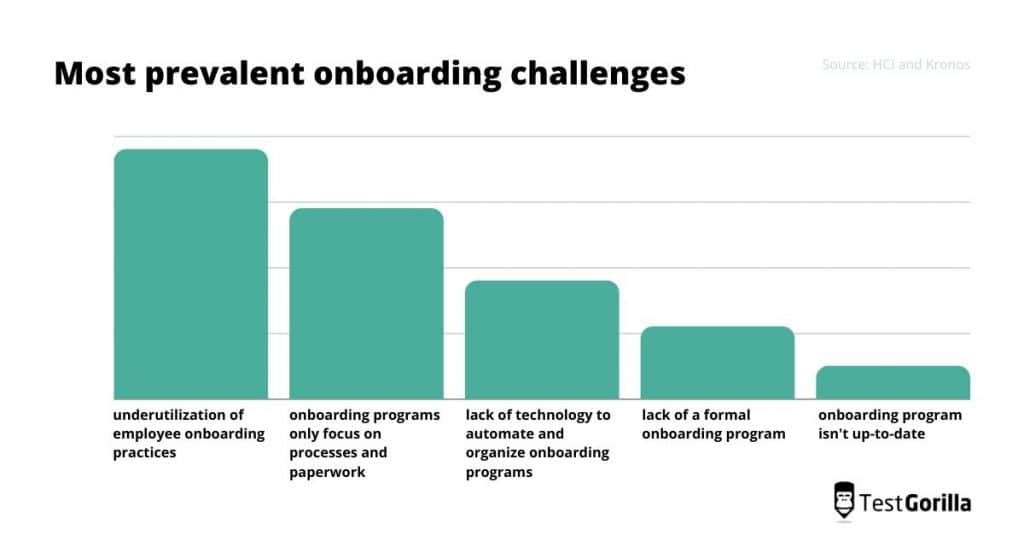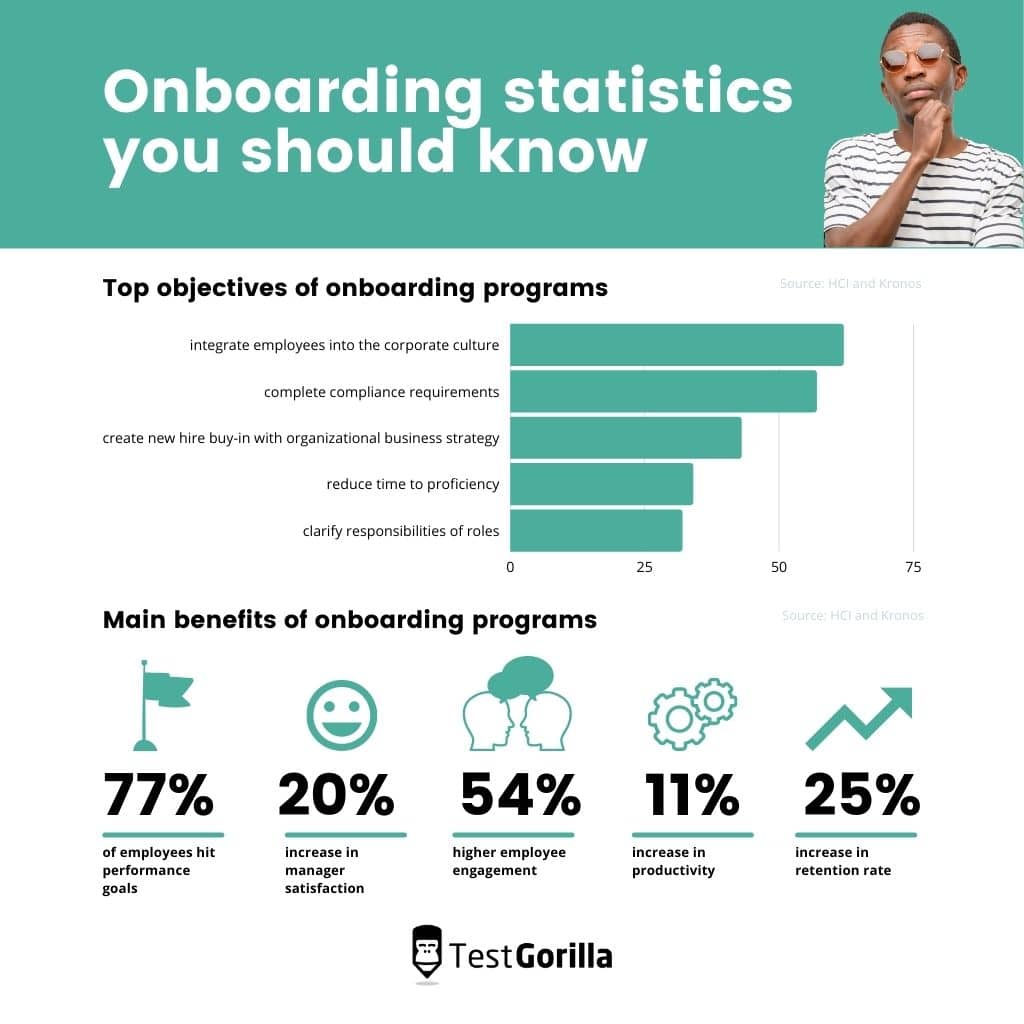Did you know that only 29% of HR departments provide cultural familiarization support to their employees after the recruitment process? Most human resources professionals know that their work isn’t over after their candidate has accepted the job. However, implementing an effective onboarding process can be a challenge. One tool that makes things easier is an onboarding checklist.
Table of contents
- What is onboarding and how can it be challenging for recruitment staff?
- What is an onboarding checklist?
- The advantages of onboarding checklists
- What are the fundamental factors to include in an onboarding checklist?
- Why prioritizing the company culture in an onboarding checklist is essential
- Sample onboarding checklist
- Help your new hires hit the ground running with onboarding checklists
What is onboarding and how can it be challenging for recruitment staff?
After your candidate has completed various interviews and skills tests and has been chosen for the job, now is the time to welcome them into your team. Onboarding is a crucial part of helping employees become accustomed to their new work environment and immersed in your company’s culture. In addition to becoming acclimated to the job itself, your new employees will become familiar with their coworkers and begin to feel more at ease in their new role.
Of course, onboarding is about more than just making your employees comfortable. It increases your team’s retention rate, performance, manager satisfaction, employee engagement, and productivity.
But the onboarding process is not always simple. There are various challenges that recruitment personnel face when onboarding new employees, including ensuring that the onboarding procedure is appropriate for the role and completing the process promptly.
An onboarding checklist is a great way to ensure that your onboarding process is effective and efficient.
What is an onboarding checklist?
An onboarding checklist is a document that outlines the key steps you need to take to onboard new employees. Each company’s onboarding checklist will vary and you’ll probably need specific checklists for some roles.
The best insights on HR and recruitment, delivered to your inbox.
Biweekly updates. No spam. Unsubscribe any time.
The advantages of onboarding checklists
The most obvious benefit of an onboarding checklist is that it will streamline the process. This efficiency will have a positive impact on employees who go through onboarding with your company. Research shows that 91 percent of new employees who go through an efficient onboarding process feel a high level of connectedness at work.
But that’s not the only benefit of using onboarding checklists.
Encourage open communication
An onboarding checklist presents a series of opportunities for the employee to ask questions. This encourages open communication, which is essential for the new employee, enabling them to clarify any ambiguities about their new role. It also shows your willingness to assist your new employee from the very beginning.
Boost cultural familiarization
A checklist will help you remember to schedule all of the important introductions you need to make to help your new hire get comfortable with their team. This can boost and promote your organization’s culture as your current employees can act as ambassadors for your company and endorse your company’s achievements.
Reduce turnover costs
Onboarding checklists help you reduce staff turnover costs in two ways. First, an effective onboarding process backed by an onboarding checklist helps you avoid alienating your employees. According to BambooHR, 59 percent of new employees who felt they were not immersed in the company culture due to poor onboarding.
Effective employee onboarding bolstered by a checklist also ensures that your candidates are clear on the role they have been hired to do. This is evidenced by data that shows that effective onboarding makes employees 14 times more likely to have strong role clarity.
Reduce stress
Using an onboarding checklist streamlines the onboarding process and helps reduce stress from the perspective of HR personnel and new employees.
With a checklist, you’ll be able to help your new hire get acclimated smoothly and learn what is expected of them as they grow within the role. This organized approach and enhanced level of clarity reduces stress and encourages productivity.
And you won’t have to worry about whether or not you’ve forgotten something, because it’s all right there on your list.
Minimize mistakes
Onboarding checklists reduce the chance that you’ll forget any crucial onboarding activities. This also makes the process less stressful for new employees, because they can be confident that they’re receiving right information without feeling like they’re drinking from a firehose.
Avoid wasting time
The onboarding process should be completed in a timely manner, but without your new employee feeling rushed through vital information. An onboarding checklist can help you avoid wasting time and ensure you give each part of the process the right amount of attention. It also prevents you from repeating information, as you can follow the checklist to see which facts or onboarding stages you might have already covered.
Establish your organization’s brand
You can describe and communicate your organization’s brand to new employees more easily with an onboarding checklist. As with the promotion of your company culture, this can be achieved by scheduling introductions to your new hire’s coworkers with the help of a checklist. Your existing employees will then share details with your new hire about the company brand, helping them to learn more about the business.
Maintain consistency
As well as helping you to include all relevant information during the onboarding process, checklists will ensure that the onboarding experience is consistent for each new employee. By following the same onboarding plan for new employees, you can make sure that each employee has a great experience when they begin work.
Stay flexible
Although you’ll include similar steps for each new employee and your onboarding process should be as consistent as possible, you might need to tweak your checklist for some roles. By including different steps in your onboarding checklist, you can personalize your onboarding process for new employees in ways that reflect their role. This helps your new hire become acclimated to their new organization more effectively.
What are the fundamental factors to include in an onboarding checklist?
Onboarding goes beyond simply ticking boxes. You might think, for example, that once you have reached the end of your checklist, your new employee is fully acclimatized and your job is complete. Although your checklist can go a long way to helping you achieve an efficient onboarding process, there are other important factors to consider and include in the list. Some of these factors are:
A list of information about the roles of your new employee’s coworkers. You can refer to this when making key introductions to members of your team
A list of equipment and workspace features to help your new hire get used to the environment in which they will work
The checklist should remind you of all forms and paperwork that the new employee needs to complete, and
It should also contain details on the key company policies and your organization’s culture.
Why prioritizing the company culture in an onboarding checklist is essential
There are several reasons to prioritize and feature your company’s culture in your onboarding checklist. As 86 percent of new hires decide whether to stay at or leave their new organizations within their first six months, giving them a good idea about the company culture as early as possible is important.
Your checklist should also prioritize your company culture because:
It provides you an opportunity to establish the norms and policies of the company
It gives your employee a clearer picture of how they will fit into your business, and
It can be a motivational factor as your employee will know what is expected of them
As mentioned, you can introduce your company culture to your employees through your existing team members. You can also achieve this by nurturing your new employees, answering their questions, and endorsing the positive achievements of your organization.
Sample onboarding checklist
If you are new to the world of onboarding and struggling to create an onboarding checklist, take a look at this 12-step checklist template that can help you draft your own:
Key steps to take during the onboarding process
1. Have your new hire complete the relevant paperwork, such as the essential employment documents.
2. Send your new employee an offer letter that details the job title, their schedule of work, start date, compensation company benefits, and the latest date the candidate needs to respond to the job offer.
3. Have your new hire complete the required employment forms, which might include a W-4 form or a document detailing a health insurance agreement.
4. Collect your new hire’s personal data, including their bank account details and contact information.
5. Send your new employee a welcome email and your current employees a new hire email announcement.
6. Send a reminder email to the new hire’s manager, informing them to arrange relevant tasks for the new employee.
7. Provide your accounting department and IT personnel with your new hire’s details. They will then add the new employee to the company payroll and IT accounts respectively.
8. Provide your new employee with onboarding details in an employee handbook.
9. Give your new employee an overview of the company, including details on the structure of your departments.
10. Put together an agenda for the new hire’s first week.
11. Assign your new hire a mentor to assist them with tasks during their first few months.
12. Set up training and career development opportunities for your new employee.
Help your new hires hit the ground running with onboarding checklists
Onboarding can be a potential challenge for HR personnel. However, it can make or break a successful relationship with your new employees. Using an onboarding checklist is vital if you want your new hires to flourish. Don’t forget to have your current employees endorse the values of your organization.
With the help of an onboarding checklist, your new employee will soon be immersed in your company, begin to feel right at home, and start hitting essential goals and targets.
You've scrolled this far
Why not try TestGorilla for free, and see what happens when you put skills first.




















